6 BS Psychology ‘Facts’ (You Believe Because Of Movies)
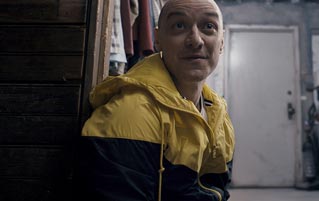
Science's understanding of mental health has improved greatly in the past century -- for instance, most specialists now agree that depression isn't caused by evil gnomes living in your skull. Unfortunately, such important knowledge lies in dusty ol' books, and most of us would rather learn about mental illnesses by watching shows about serial killers. And hey, as it turns out, maybe this isn't such a great idea!
You'd think it was a little strange if Grey's Anatomy had an episode about curing hemorrhoids using a goat sacrifice. And yet, when it comes to mental health, we don't even blink at wrong, outdated, and excruciatingly dumb-ass ideas like ...
"Everyone With Tourette Syndrome Curses Like A Sailor!"
Don't Miss
Spotting a character with Tourette syndrome is as easy as spotting one from planet Pandora. You'll immediately know them from the string of hilarious curse words involuntarily coming out of their mouths -- usually during awkward situations, like at a funeral, a fancy event, or during a trial (after they got fired from their job due to their life-altering condition).

Comedy gold!
But despite obscene outbursts being Hollywood's go-to depiction of Tourette's sufferers, this particular symptom really only shows up in about 10 percent of them. Tourette's manifests in childhood as a series of tics -- think blinking, twitching, clearing your throat, et cetera. And for most people, it becomes less pronounced or goes away in their late teens. Of the minority who suffer from coprolalia -- the medical term for turning into Gordon Ramsay without warning -- many are able to deal with it by mumbling curse words when in public or simply repeating them in their mind. You know, like everyone else on the planet.
Even in the worst cases, coprolalia usually presents itself as single-word outbursts, not complex strings of fuck-words straight out of an erotic novel. For Hollywood, though, the awkwardness of having someone scream random vulgarities is just so much funnier than uncontrollable blinking or watching a young child commit self-harm, so we get scenes like this one instead:
Oh, Amy. This is beneath you. (You're good, Rob.)
Occasionally, movies do attempt to get it right. Like when The Boondock Saints made sure to give Doc some realistic blinking and stuttering ... only to put the man smack dab in the middle of a nun-filled hospital so he could offend their nunnish sensibilities with his swearing. So, points for trying, we guess?
"Postpartum Depression Turns You Into A Baby-Hating Psychopath!"
Typically, when a movie mama comes down with a case of the ol' baby blues, she becomes a violent, neglectful, blubbering mess. On the show Nashville, for instance, postpartum depression makes the country singer protagonist forget to feed her newborn child and hurl a snow globe at her husband (who is also a country singer, as is presumably the baby).
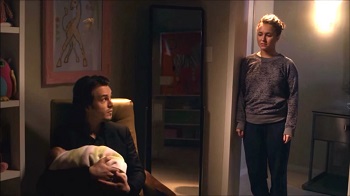
"On the upside, we just got material for like ten hit songs."
On Jane The Virgin, Jane's PPD-suffering sister abandons her twins because she "can't connect" with them. And then there's the big combo in Girls: A mom feels the urge to hurt her baby daughter, so she ditches her instead, forcing her brother to take care of it.

Yeah, like leaving your kid with a Sith Lord will help.
In the TV-verse, it's like all moms are just looking for an opportunity to go full-on Mommie Dearest. In reality, it's true that 80 percent of mothers feel moody in the weeks after giving birth, but that's not the same thing as postpartum depression. PPD is an actual medical condition that affects around 15 percent of new moms -- which doesn't mean they all want to dump their children in a dumpster. In fact, mothers diagnosed with PPD tend to worry too much about their infants and become overprotective of them. You might recognize this as the total opposite of neglect.
As for violence, thoughts of hurting herself or the baby may occur, but it's extremely rare for this to translate into an actual urge. That's more in line with yet another condition called postpartum psychosis, which follows as many as 0.2 percent of births. Of that number, only 4-5 percent actually go ahead and do something about it. (Also, one of TV's best depictions of postpartum depression wasn't on some heavy drama, but on freaking Scrubs, a show about a man-child doctor being stalked by a magic janitor. Go figure.)
"People With Mental Illness Are More Likely To Be Criminals!"
If we've learned anything from watching Batman punch shit, it's that most mentally ill people are one colorful costume away from trying to take over the world. Arkham Asylum is packed with villains representing every imaginable type of mental disorder, from dissociative identity disorder, to schizophrenia, to the one that makes you shoot condiments out of guns.

On the other hand, shaping all your objects, vehicles, and clothes like bats is perfectly normal.
The Batman movies are far from the only ones to treat the mentally ill as villains. Single White Female, Fatal Attraction, Silence Of The Lambs, Secret Window, Dressed To Kill, Psycho, Split -- it's practically its own subgenre. After all, you don't need proper character motivations when you can just type, "Pregnant pause: HE'S CRAZY!"
Of course, here in the real world, people suffering from mental illnesses are ten times more likely to be the victims of violent crime than the general population, and account for only 3-5 percent of violent acts. Yes, there are people whose mental illness makes them a danger to themselves or others, but they're the exception. One in five Americans are not currently battling Batman or the FBI. The overwhelming majority of violent criminals don't have mental health problems, and yet the number of Americans who blame crime on "crazy people" has doubled since the '50s. Huh, wonder why that could be?
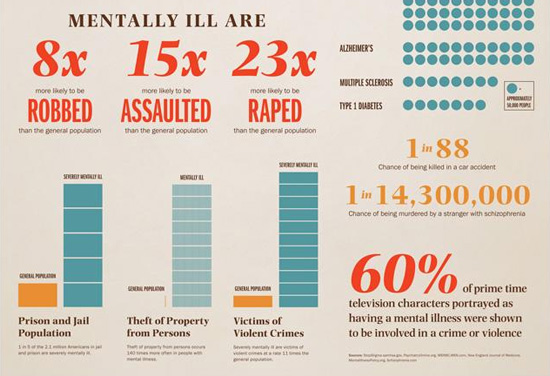
(Hint: lower-right corner.)
Even if media depictions of mentally ill people didn't explicitly cause this misconception, it sure hasn't helped. How many movies can you think of where the story is about saving nice, normal people from the insane weirdo, and how many can you think of where it's the other way around? If art's job is, as Michael Bay or someone once said, to hold a mirror up to nature, then Hollywood is more like a weird funhouse mirror that's also in a sauna.
"I Cured My Eating Disorder In An Episode!"
No family sitcom is complete without that episode where one of the characters develops an eating disorder, is confronted by the others, and finally overcomes it. These shows always expect a pat on the back for touching such subjects, but you know what would be even more helpful? Not giving the impression that these are tiny problems you can solve with but one parental pep talk.
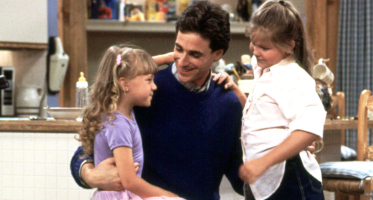
"Dad, why was your pep talk nothing but F-bombs?"
For instance, take this episode of Full House. In "Shape Up," D.J. starts obsessing about models and avoiding food, until she has a heartwarming conversation about her health and ... that's it? A few episodes later, she's eating ice cream with her sister(s) Michelle. Problem solved! Meanwhile, Diff'rent Strokes had a less subtly titled one called " Bulimia," which ended with a recurring character admitting she had a problem (and then never appearing on the show again).
In most cases, body-image issues frequently surface, resolve, and are forgotten within the span of a week, like Instagram celebrities, instead of being something that men and women can struggle with for their whole lives. Relapse is common, and recovery can take seven to ten years, which is longer than Full House's original run. It's like if Friends had an episode called "The One Where Joey's Arm Falls Off," and then never mentioned it again.
The problem is that episodic TV's one-off nature means you can't have The Eating Disorder Episode twice any more than you can have The Vegas Episode twice. Otherwise it might look like you're just recycling old material, and they'd never stoop that low ...

Wait, how's that dog still alive?
"Don't Take Your Meds! They'll Ruin What Makes You Special!"
When Hollywood isn't treating mental illness as a villain origin story or disposable plot, it's usually treating it as some sort of superpower. Take Monk, the show about what happens when writers realize that they can use obsessive-compulsive disorder as a quirk factory.
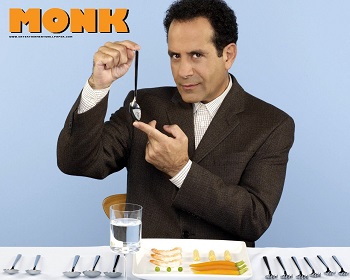
"Damn, the network didn't like the 'spoon fetishist' angle for the pilot. How do we reuse these promo shots...?"
Monk is able to solve crimes because he is so obsessive that he has special noticing powers. Sure, the show is grossly inaccurate in how it depicts OCD, but it's good that people with mental disorders can have one positive role model, right? Sure, if shows like this one didn't regularly tell them that medication is the devil and will murder their souls.
Medication compliance (that is: actually taking your pills) is a key part of treating mental illness -- and the more severe your condition, the worse the consequences if you go off your meds. And yet, in the episode "Mr. Monk Takes His Medicine," Monk does exactly that, is magically cured, and equally magically becomes hot garbage at the solving of crimes. He even starts referring to himself differently ("the Monk"). In the end, he stops taking the medicine so he can be just Monk again. That was the only way the episode could end: The writers think OCD is a superpower, and without it, there's no show. It's like when Ally McBeal considered taking medicine to control her hallucinations -- aka the only reason anyone ever talked about her show -- only to immediately decide against it, because her illness makes her feel "magical."

She still doesn't notice she actually married the guy who plays Wedge.
And then there's Silver Linings Playbook, which has this scene, where Bradley Cooper and Jennifer Lawrence talk about all the medicines they've tried that make them not as "sharp," and bond over how they stopped taking them. While some people definitely do get put on medications that leave them feeling flat, gray, or tired all the time, the takeaway here really shouldn't be "Well, I guess all medicine is bullshit. Better try ballroom dancing instead!"
"Split Personalities Are Separate, Complete People!"
Hollywood usually portrays someone with dissociative identity disorder (what used to be called "multiple-personality disorder") as a character who is actually two or more full characters, often with their own names, outfits, and at least one annoying accent. In movies like Secret Window or Split, the personalities can even talk to each other, and often they'll fight until at least one of them is vanquished (usually the evil-er one).
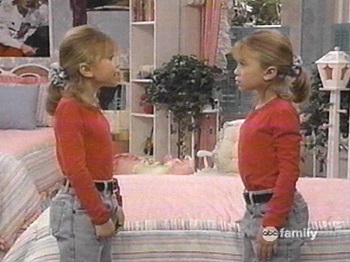
Wait, wrong entry.
Hollywood's take on DID is a tempting premise, especially as a cheap reveal (see: The Club Where They All Fight) or lazy, red-herring generator in a murder plot. For instance, all the clues may point to a woman, so this man couldn't have done it -- but actually, the "woman" was his cross-dressing alternate personality, as in Dressed To Kill, Psycho, and a whole bunch of shows. Yet another reason for this gimmick's popularity is that actors fucking love it, because they can show off their vaunted range.
But here's the thing with DID -- some researchers believe that the disorder is actually induced in suggestible patients by their psychologists/psychiatrists (who are probably Hitchcock fans themselves). In fact, as we've mentioned before, possibly the most famous pop-culture portrayal of this disorder, Sybil, was basically a long con in book/movie form. In any case, DID isn't supposed to be about multiple, distinct personalities -- it's about the fragmentation of a single identity. Think of a vase breaking into tiny shards, not into a bunch of full-sized, functional vases.

Also, note that none of the shards will be totally ripped.
It's been decades since medical science made this important distinction (hence the name change), but Hollywood's still stuck on the old, tired stereotype because, well, cocaine, we guess. Yeah, two can play that game.
Nimby Smith thinks about TV all the time and can be reached at Nimby (dot) Writer (at) Gmail (dot) Com, if any fancy Hollywood agents are interested in TV scripts.
Also check out 6 Mental Illness Myths Hollywood Wants You To Believe and 5 Ways We Are Absolutely Lost When It Comes To Mental Health.
Subscribe to our YouTube channel, and check out The One Self-Help Group We'd Actually Join, and other videos you won't see on the site!
Follow us on Facebook, and we'll follow you everywhere.
Gear up for a very important mission with The Guardians Of The Galaxy with this adorable Groot tee. Or show off your quiet intensity in this nifty Drax shirt. Hurry, the universe NEEDS you.